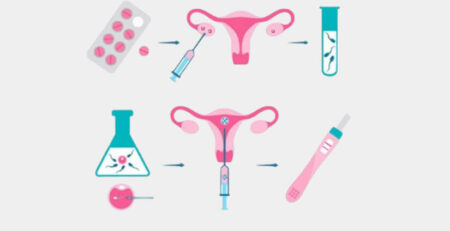Is IVF Safe? What is the Actual Truth
When considering fertility treatments, In Vitro Fertilization (IVF) is often at the forefront of people’s minds. However, the question of IVF safety tends to linger. With advanced medical technology and ever-improving IVF success rates, it’s natural to ask: Is IVF safe?
Let’s get to the actual truth of this question and explore the nuances surrounding the safety of this life-changing procedure.
Debunking Myths and Addressing Concerns
You may have heard that IVF poses significant risks or is riddled with complications. These misconceptions can be anxiety-inducing. However, IVF today is a well-regulated, medically supervised procedure that has helped millions of couples experience the joy of parenthood. But how safe is it really? We’re about to reveal the facts, backed by research and expert insights, to help you make an informed decision.
The IVF Process – Breaking Down the Basics
Before diving into the safety aspects, it’s essential to understand what IVF entails. The process involves stimulating your ovaries with fertility drugs, retrieving eggs, fertilizing them with sperm in a lab, and transferring the resulting embryo back into your uterus.
Each of these steps is meticulously monitored by an IVF specialist in Delhi or elsewhere. The procedure has evolved over the decades, with safety and success rates improving year after year. It’s essential to remember that while no medical procedure is entirely risk-free, the safety protocols around IVF have been honed to minimize potential issues.
IVF Safety: What Are the Risks?
The term IVF safety covers a broad range of potential risks, from mild side effects to more serious complications. Let’s explore each in detail:
- Ovarian Hyperstimulation Syndrome (OHSS): This is a condition where the ovaries respond too strongly to fertility medications. It can cause abdominal pain, bloating, and in severe cases, more significant health concerns. However, advances in IVF protocols have drastically reduced the incidence of OHSS, with close monitoring and tailored medication dosages preventing the condition in most cases.
- Multiple Pregnancies: While it might seem like a bonus to conceive twins or triplets, multiple pregnancies come with increased risks for both mother and babies, such as preterm birth. Modern IVF practices, such as transferring fewer embryos, are designed to reduce this risk, ensuring IVF safety remains a priority.
- Ectopic Pregnancy: Although rare, IVF can sometimes result in an embryo implanting outside the uterus, such as in the fallopian tubes. Ectopic pregnancies can be dangerous, requiring immediate medical attention. Fortunately, IVF specialists are vigilant in monitoring early pregnancies to catch this condition quickly.
- Birth Defects: This is a concern many people have regarding IVF, yet numerous studies have shown that the risk of birth defects in babies conceived through IVF is comparable to that of natural conception. Proper screening and genetic testing before embryo transfer can further enhance IVF safety and success.
- Psychological Impact: Fertility treatments can be emotionally taxing. The stress of undergoing IVF, coupled with the hope and anxiety tied to outcomes, can affect mental health. Counseling and support networks are available, and many IVF clinics offer psychological support as part of their care packages.

Lifestyle Factors That Influence IVF Safety
Apart from the technical aspects of IVF, lifestyle factors can also influence the overall safety and success of the treatment. By focusing on maintaining a healthy lifestyle, you can help optimize your chances of a successful, safe IVF outcome.
- Diet and Nutrition: Eating a balanced diet rich in fruits, vegetables, whole grains, and lean proteins can help create a healthy environment for conception. Avoiding excessive caffeine, alcohol, and processed foods is crucial. For those undergoing IVF, it’s often recommended to follow a fertility-friendly diet under the guidance of an IVF specialist in Delhi to ensure both IVF safety and success.
- Exercise: Moderate physical activity can benefit fertility and overall health, but high-intensity exercise may have the opposite effect. Your IVF specialist will likely recommend gentle activities like walking, yoga, or swimming during your treatment cycle to maintain IVF safety.
- Smoking and Alcohol: Smoking and alcohol consumption are major factors that can negatively affect both natural fertility and IVF outcomes. Quitting smoking and limiting alcohol intake can significantly improve both the safety and success of your IVF journey.
- Stress Management: High levels of stress can hinder fertility, so managing stress through relaxation techniques, counseling, or mindfulness practices is vital during IVF treatment. Clinics offering comprehensive care will often include stress-reducing strategies as part of your treatment plan.
How to Choose the Right Clinic for IVF Safety
Not all IVF clinics are created equal, and choosing the right one can make a substantial difference in your experience, success rates, and safety. Here’s what you should look for when selecting a clinic:
- Experience of the Specialists: The expertise and experience of the IVF specialist are critical to ensuring a smooth and safe treatment. A skilled IVF specialist in Delhi with years of experience can tailor the treatment to your unique needs, optimizing both safety and success.
- Clinic Accreditation and Technology: Look for clinics that are accredited by reputable health organizations and utilize the latest technology. High-tech labs, skilled embryologists, and modern fertility treatments ensure that the clinic is committed to IVF safety.
- Success Rates: Though IVF success rates vary from patient to patient, the clinic’s overall track record is a good indicator of their expertise. Compare success rates while considering age, underlying fertility issues, and whether the clinic has a reputation for safe, ethical practices.
- Patient Support: Beyond the medical aspects, how a clinic supports its patients emotionally and mentally can have a significant impact on your IVF journey. Clinics that offer psychological support, transparent communication, and patient-centered care ensure a safer, more positive experience.
Success Stories: Real People, Real Results
Hearing from real patients who have undergone IVF can be incredibly reassuring. These success stories help you understand that you’re not alone in this journey and that IVF can indeed be safe and effective.
Take the example of Neha and Rahul, a couple from Delhi who had been trying to conceive for over five years. They consulted an IVF specialist in Delhi who provided them with personalized care and guidance. Through multiple cycles of IVF, along with a holistic approach to lifestyle management, they achieved a successful pregnancy. They attribute their success not only to the advanced technology used but also to the meticulous attention to IVF safety throughout their treatment.
The Role of Age in IVF Safety and Success
Age plays a critical role in both the safety and success of IVF. Women under 35 typically experience higher IVF success rates, while those over 40 may face more challenges. However, advancements in fertility treatments, including egg freezing, embryo pooling, Ovarian rejuvenation and donor eggs, have made it possible for older women to achieve successful pregnancies with IVF.
Older women might experience higher risks, such as preeclampsia or gestational diabetes, but these risks are well-managed by experienced IVF clinics. Pre-treatment counselling and thorough medical evaluations help determine the safest approach to IVF for each individual.
The Future of IVF: Advancements Enhancing Safety
The future of IVF looks promising with continual advancements in technology aimed at improving safety and outcomes. Here are some innovations to watch for:
- Artificial Intelligence in Embryo Selection: AI is increasingly being used to select the healthiest embryos for transfer, improving IVF success rates while reducing the likelihood of complications. This technology enables clinics to further ensure IVF safety by transferring only the most viable embryos.
- Non-Invasive Testing: Researchers are developing non-invasive techniques to evaluate embryo health and maternal readiness, minimizing the risks associated with more traditional invasive testing methods.
- Gene Editing and Stem Cell Research: Although still in early stages, gene editing and stem cell research hold the potential to revolutionize fertility treatments, making IVF not only safer but also more effective.
Conclusion: The Truth About IVF Safety
So, is IVF safe? The short answer is yes. While there are risks associated with any medical treatment, the strides made in fertility medicine over the past few decades mean that IVF safety is more robust than ever. With personalized treatment plans, advanced technology, and expert care, IVF has become a safe and effective option for millions of people worldwide. Understanding the potential risks and being proactive in managing them is the key to a successful and safe IVF journey.
If you’re considering IVF but have concerns about safety, Dr. Rhythm Gupta, a renowned IVF specialist in Delhi, offers expert consultations and personalized treatment plans. With a high track record of IVF success rates and a deep commitment to patient safety, Dr. Gupta ensures that every step of your fertility journey is guided with care and precision. Book your consultation today to explore your options and begin your safe and supported path to parenthood.












